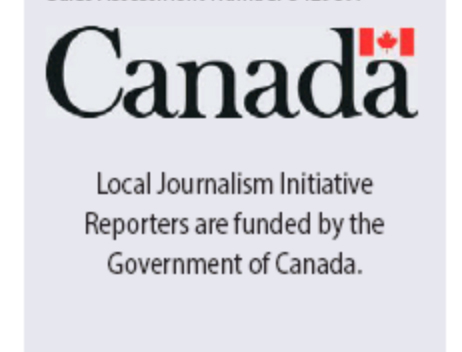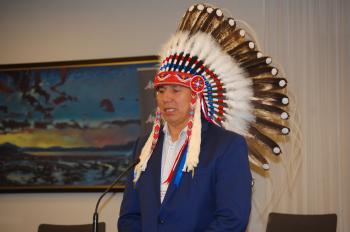Image Caption
Summary
Local Journalism Initiative Reporter
Windspeaker.com
Northern Alberta’s Treaty 8 First Nations are re-enforcing their sovereign rights with the establishment of No. 8 Government House and they will be letting the Queen know that they will be dealing directly with her.
They are now engaging with the 15 Treaty 8 Nations in northwestern Saskatchewan, northeastern British Columbia and the southwestern portion of the Northwest Territories to convince them to join the Alberta nations.
“That collective positioning is going to elevate, not only the unity, but also the political push that’s bringing Canada to the table or the Governor General for Canada to the table. That’s what the treaty was about. This is our understanding of what the treaty was about. They have their interpretation and we have our interpretation,” said Alberta Treaty 8 Grand Chief Arthur Noskey.
The Treaty 8 Alberta chiefs and headmen met July 20 through July 23 and passed a resolution to create No. 8 Government House. Twenty-two of the 24 nations supported the move, which will see a collective constitution and laws developed. Sawridge and Kapawe’no First Nations are not part of that process as they already have their own constitutions and laws, said Noskey.
He is confident that Treaty 8 Nations will be able to come together in developing a constitution and laws. Noskey says there is “not too much difference” between the Dene and Cree when it comes to the “relationship to the land,” children, family and culture. Chiefs will be going to their nations to get input on those laws.
“It takes a sovereign nation to make treaty with another sovereign nation. Over the course of the last 121 years, the First Nations people have kind of lost that, that they’re a sovereign nation and able to make laws,” he said. “Our sovereign partners have been the ones that are making these laws that are applicable to us.”
Noskey points to Alberta’s UCP government and the Critical Infrastructure Defence Act (Bill 1), which came into force in June. The Act underscores the need for Treaty 8 to exercise its inherent rights and decision-making authority, Noskey said. The Bill came after rail blockades were established in support of Wet’suwetien hereditary chiefs’ sovereign right to determine development on their traditional territories.
The Act protects “essential infrastructure,” defined in part as pipelines, refinery sites, highways, and railways, from being “wilfully” destroyed, damaged, obstructed or interrupted.
In a letter to Premier Jason Kenney denouncing the Act, Noskey wrote, “… It was created and enacted in complete disregard and ignorance to the Crown’s Treaty relationship and obligations with our Sovereign Nations.”
It’s a marked change in relations between the UCP government and First Nations in just over a year’s time. After a June 2019 meeting between Kenney, cabinet ministers and chiefs, Noskey had commented he felt the UCP was a government “willing to address the issues that we faced in the past.”
“We realize (Treaty 8) is a collective, an agreement. It included a territory that the Imperial Crown, through its process, fragmented the territory as a whole through provinces. But that is their system. That is not our system,” said Noskey.
“They’re delegating the lawmaking ability from Canada to the province and now they’re trying to enforce it on a sovereign nation. It’s kind of like an administrator telling the government how to operate. And that doesn’t work anymore.”
Alberta Treaty 8 First Nations are in the process of undertaking economic impact assessments of their lands to determine if Nations had the knowledge, involvement, free, prior and informed consent of activity underway on their territories.
“When you look at that, how much does the province benefit by selling licences to hunt, fish and trap? This is the stuff we never gave up. This is where the collective is going. When we start talking about the revenue sharing, the benefits coming back to the Nation, then we’ll have a position. Then we’ll have numbers,” said Noskey.
Revenues realized by the nations from that economic activity will go toward honouring the treaty and providing health care, education and other services on reserves at the same level they are provided to the rest of Canada, Noskey said.
The details and mechanics of No. 8 Government House have yet to be worked out, says Noskey. While it will be located in Treaty 8 territory, its exact location has not been decided. The chiefs will be the decision-makers, but the system to be used is still being “scoped out” although meetings are expected to occur three to four times a month.
“When those laws are at the Nation level and they’re introduced collectively, I think there’s going to be commonality and unity through that and then our leadership will be elected to protect and enhance those laws, not to create their own ideas, create their own vision of what the Nation is supposed to be,” said Noskey.
“Our people that entered into treaty, into a relationship (with the Crown), there was a vision there and now we’re realizing it, because under its current system today, it’s been abuse, it’s been poverty, you name it, it’s to undermine the First Peoples of this land and that’s going to change.”

Local Journalism Initiative Reporters are supported by a financial contribution made by the Government of Canada.

